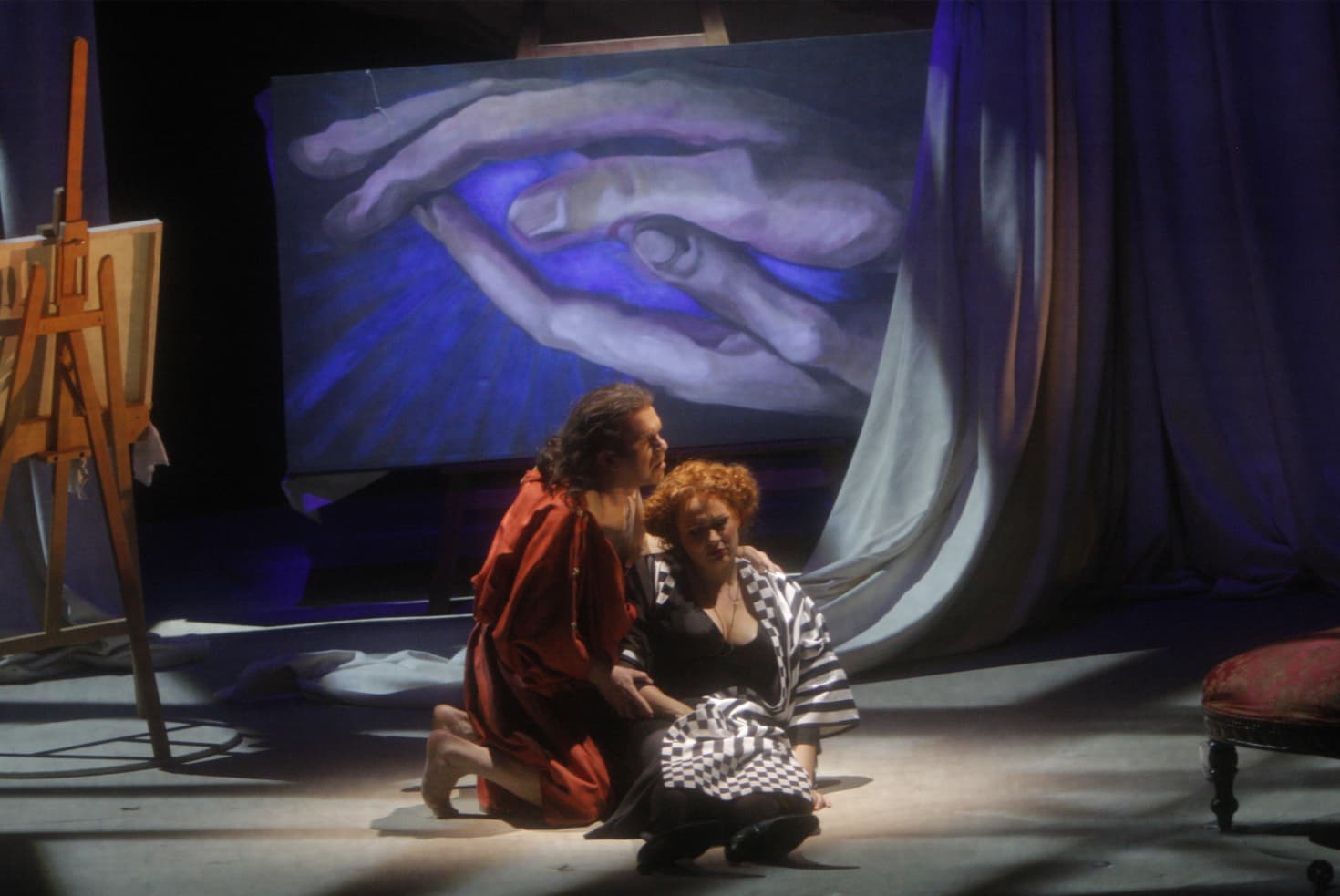While the operas of Richard Strauss are often thought of as the final flowering of the great German opera tradition, a number of his equally talented contemporaries fell victim to the anti-Semitic or ultraconservative politics of Nazi Germany. Music Director James Conlon has made it his personal mission to bring the works of these lesser known composers to the stage for much-deserved recognition.
LA Opera’s Recovered Voices initiative, launched in 2007, is one of the company's most important and celebrated artistic achievements. Made possible thanks to generous support from Marilyn Ziering and the Ziering Family Foundation, Recovered Voices has not only been a welcome journey into the supercharged emotions and lush imagery of late Romantic music, it has been a critical step in bringing some of the great lost masters of opera to light. With the launch of Recovered Voices, LA Opera became the only major American opera company to regularly program the works of composers affected by the rise of the Third Reich.
With its racist ideology and systematic suppression—particularly (although not exclusively) of Jewish musicians, artists and writers—the Nazi regime silenced two generations of composers and, with them, an entire musical heritage. The suppression of these composers and musicians caused the greatest single rupture in what had been a seamless transmittal of German classical music. Recovered Voices brings to light many little known operatic selections and articulates the enormous debt the American musical heritage owes to the talented musicians who emigrated to Hollywood and Broadway and brought their distinctive personalities to music that has since become distinctly American.
LA Opera's 2023/24 season includes a much-anticipated revival of one of the company's most celebrated Recovered Voices presentations: The Dwarf by Alexander Zemlinsky, first presented at LAO in 2008. The opera will be performed on a double bill with a rare staging of Highway 1, USA by William Grant Still (1895-1978), a leading Black American composer whose work has also been neglected because of racial prejudice; although his 1930 Afro-American Symphony has enjoyed popularity, his operas have received only sporadic performances over the years.
A Florentine Tragedy, Alexander Zemlinsky (2007)
An astonishing variety of musical riches was unveiled in the meticulously prepared 2007 concert that inaugurated the Recovered Voices. The concert's centerpiece was a performance of Alexander Zemlinsky’s hair-raising one-act opera, Eine florentinische Tragödie (A Florentine Tragedy), starring baritone Donnie Ray Albert, soprano Tatiana Pavlovskaya and tenor Anthony Dean Griffey (shown above). Alexander Zemlinsky (1871-1942) was born in Vienna and studied at the Conservatory of the Society of the Friends of Music. By 1910, he had written four operas. In 1911, he went to Prague where he conducted operas at the Deutsches Landestheater until 1927. His operas A Florentine Tragedy and The Dwarf, dating from this period, are some of the highlights of his œuvre. In 1927 he moved to Berlin, where he worked together with a rising generation of conductors such as Otto Klemperer, Georg Szell and Erich Kleiber. In 1931 he took on a teaching appointment at the Music Academy but after the seizure of power by the Nazis and in 1933 the passing of the law which prohibited Jews from being employed in state service, he had to resign. He returned to Vienna, but as cultural life there increasingly became influenced by political developments, he was no longer able to become established. After Hitler’s invasion, Zemlinsky and his family fled to New York. He was a broken man when he arrived. After suffering several strokes, he died in 1942. After his death, the music of Zemlinsky was more or less disregarded, and it was not until the 1970s that his central works began to be rediscovered.
The inaugural Recovered Voices concert also featured excerpts from Erich Korngold’s dreamlike Die tote Stadt (The Dead City), Erwin Schulhoff’s darkly haunting Flammen (Flames), Viktor Ullmann’s poignant Der Kaiser von Atlantis (The Emperor of Atlantis), Walter Braunfels’ sunny Die Vögel (The Birds) and Franz Schreker’s hedonistic Die Gezeichneten (The Stigmatized), along with Ernest Krenek’s jazz-inflected Jonny spielt auf (Johnny Tunes Up).
The Broken Jug by Viktor Ullmann (2008), U.S. premiere Viktor Ullmann’s Der zerbrochene Krug (The Broken Jug) received its U.S. premiere at LA Opera in 2008, in a production starring bass-baritone James Johnson as Judge Adam and mezzo-soprano Elizabeth Bishop as Frau Marthe. Based on a play by German poet Heinrich von Kleist, the absurdly comic opera relates the story of a judge presiding over a trial to determine who is at fault for breaking a prized jug; it is gradually revealed that the judge himself was responsible under a humiliating set of circumstances.
Viktor Ullmann’s Der zerbrochene Krug (The Broken Jug) received its U.S. premiere at LA Opera in 2008, in a production starring bass-baritone James Johnson as Judge Adam and mezzo-soprano Elizabeth Bishop as Frau Marthe. Based on a play by German poet Heinrich von Kleist, the absurdly comic opera relates the story of a judge presiding over a trial to determine who is at fault for breaking a prized jug; it is gradually revealed that the judge himself was responsible under a humiliating set of circumstances.
Viktor Ullmann (1898-1944) was a Czech intellectual who wrote over 20 works while interned in the concentration camp at Terezín before his death in Auschwitz. He was born in Teschen (now Cieszyn, Poland) to parents of Jewish descent. As soon as he had finished school he volunteered for military service. After deployment on the Italian front, he began the study of law at Vienna University. He was also accepted in Schoenberg’s composition seminar. In 1919 he broke off both courses of study. His mentor was now Alexander Zemlinsky, under whose direction he was conductor at the New German Theatre of Prague until 1927. In the following season, he was appointed head of the opera company in Aussig, but his ambitions were deemed to be rather too progressive for the local audience at that time. Ullmann wrote some 40 compositions before World War II, including three operas, two string quartets, four piano sonatas, various orchestral works and songs for voice and piano. The Broken Jug was the last work that Ullmann composed before he was imprisoned at Theresienstadt (Terezín) in 1942. He took an active part in the musical life there and produced the works for which he is best remembered: several song cycles, three piano sonatas, a string quartet, the symphonic poem Don Quixote Dances a Fandango and the opera The Emperor of Atlantis. In 1944, he was transported to Auschwitz, where he died.
The Dwarf by Alexander Zemlinsky (2008) As a follow-up to Zemlinsky's A Florentine Tragedy, LA Opera presented a rare production of the composer's The Dwarf in 2008, starring tenor Rodrick Dixon in the title role and soprano Mary Dunleavy as Donna Clara. The opera returns to the Dorothy Chandler Pavilion stage in 2024, on a double bill with Highway 1, USA by American composer William Grant Still.
As a follow-up to Zemlinsky's A Florentine Tragedy, LA Opera presented a rare production of the composer's The Dwarf in 2008, starring tenor Rodrick Dixon in the title role and soprano Mary Dunleavy as Donna Clara. The opera returns to the Dorothy Chandler Pavilion stage in 2024, on a double bill with Highway 1, USA by American composer William Grant Still.
LA Opera's 2008 double bill of The Broken Jug and The Dwarf was filmed and released on DVD and Blu-Ray on the Arthaus label.
The Birds, Walter Braunfels (2009), West Coast premiere
Walter Braunfels’ delightful 1920 opera Die Vögel (The Birds) is a late-Romantic work reminiscent of Strauss and Wagner. LA Opera's 2009 West Coast premiere of the work, starring tenor Brandon Jovanovich and bass-baritone James Johnson, came only four years after the opera's U.S. premiere at the Spoleto Festival in Charleston, South Carolina.
German composer Walter Braunfels (1882-1954) enjoyed great popularity between the two World Wars, but the half-Jewish musician was forced to withdraw from public life by the Third Reich; his music was banned as “degenerate” and fell into oblivion after his death. The composer freely adapted his libretto for The Birds from the ancient Aristophanes comedy into what he described as an “airy play of imagination,” in which two friends, disillusioned with their fellow man, search for an idealistic land of dreams in the realm of the birds. The work’s premiere in Munich was so successful that there were nearly 50 subsequent performances there, with later productions in Berlin, Vienna, Cologne and elsewhere.
LA Opera's production of The Birds was filmed and released on DVD and Blu-Ray on the Arthaus label.
The Stigmatized, Franz Schreker (2010), U.S. premiere The Stigmatized (Die Gezeichneten, 1918) is the best known work by Franz Schreker, one of the most important and successful opera composers of the early 20th century. The son of a Jewish father and Catholic mother, he formed the Philharmonic Chorus, a leading forum for new music in Vienna in 1907. The 1912 premiere in Frankfurt of his opera Der ferne Klang (The Distant Sound) established his fame overnight. This coincided with his appointment as a professor at the Music Academy in Vienna. With the 1918 premiere of Die Gezeichneten in Frankfurt, Schreker moved to the front ranks of contemporary opera composers. The 1920 premiere of Der Schatzgräber (The Treasure Seeker), also in Frankfurt, was the highpoint of Schreker’s career. In the same year he became director of the Hochschule für Musik in Berlin.
The Stigmatized (Die Gezeichneten, 1918) is the best known work by Franz Schreker, one of the most important and successful opera composers of the early 20th century. The son of a Jewish father and Catholic mother, he formed the Philharmonic Chorus, a leading forum for new music in Vienna in 1907. The 1912 premiere in Frankfurt of his opera Der ferne Klang (The Distant Sound) established his fame overnight. This coincided with his appointment as a professor at the Music Academy in Vienna. With the 1918 premiere of Die Gezeichneten in Frankfurt, Schreker moved to the front ranks of contemporary opera composers. The 1920 premiere of Der Schatzgräber (The Treasure Seeker), also in Frankfurt, was the highpoint of Schreker’s career. In the same year he became director of the Hochschule für Musik in Berlin.
The decline of Schreker’s fortunes began with the lukewarm reception to his opera, Irrelohe (Cologne, 1924) and the failure of Der singende Teufel (Berlin, 1928). Right-wing demonstrations marred the premiere of Der Schmied von Gent (Berlin, 1932), and Nazi pressure forced the cancellation of the Freiburg premiere of Christophorus. In 1932 he was forced to resign his position in Berlin and took up a master class at the Prussian Academy of the Arts. He was placed on leave in May 1933 and dismissed in September of that year. In December, he suffered a stroke, succumbing in March 1934. His music fell into obscurity.
The Stigmatized is a rapturously evocative late-Romantic tragedy in which an unlikely love triangle plays out on a paradise pleasure island amidst a group of decadent nobles who are marked by lust and depravity. Although none of Schreker’s operas had ever been staged in the American hemisphere before LA Opera's performances, The Stigmatized has begun to return to prominence in Europe. A 1995 Berlin Symphony Orchestra recording was part of Decca’s celebrated Entartete Musik series and a spectacular 2005 Salzburg Festival production was filmed and released on DVD. LA Opera’s new production of The Stigmatized featured a large cast headed by tenor Robert Brubaker as Alviano (a role he had performed in the Salzburg production) and soprano Anja Kampe as Carlotta. The LA Opera performance was recorded and released on Bridge Records.




